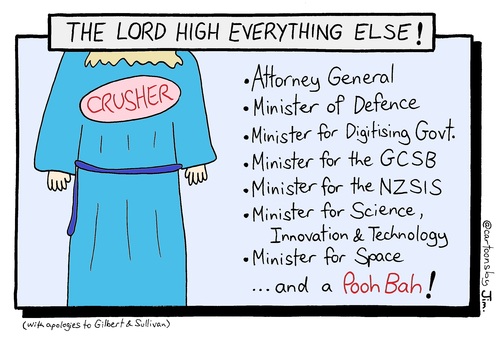Griffin on Tech: The minister of everything tech-related gets to work
You have to hand it to Judith Collins - the veteran politician hasn’t shied away from a large workload in the new coalition government.
Collins, as our cartoonist Brendan Boughen so artfully portrays it today, has no less than seven portfolios as a cabinet minister - including Attorney General, Minister of Defence, Minister for the SIS, Minister for the GCSB, Minister for Digitising Government, Minister for Space, and Minister for Science, Innovation & Technology.
Phew, that’s a lot of responsibility - the Attorney General and Minister of Defence portfolios alone are enough to keep a cabinet minister busy. But what a line-up - that would be my dream collection of portfolios as a fantasy cabinet minister - bar the Attorney General role which I wouldn't want to be anywhere near!
There’s certainly synergies among those seven portfolios. For instance, cybersecurity suffered to gain visibility and attention in cabinet in the previous government - it was mainly the purview of Andrew Little as Minister for the GCSB who was focused on critical infrastructure and the agency’s role in helping secure it.

Joined up thinking on cybersecurity
But successive Labour MPs who filled the Minister for Communications and the Digital Economy portfolio did little beyond funding (or underfunding) the work of CERT NZ to support the private sector to up its game on cybersecurity. Late in its second term, Labour folded CERT NZ into the GCSB in a move widely criticised by the business community.
At least Collins will be in a good position to think strategically about cybersecurity as she takes a wider view of tech-related priorities. There’s arguably value in a minister having responsibility for technology and science, as well as intelligence services, given the geopolitical situation and the national security implications for emerging technologies such as AI, and quantum computing. Whether New Zealand accepts an invitation to join Pillar II of the AUKUS security arrangement will no doubt be getting Collins’ attention early in the new year.
But can one person really devote adequate attention to such a wide range of complex issues - as diverse as tweaking our regulatory settings governing rocket launches, to integrating AI into government services ? Loading up Collins with portfolios seems more a symptom of the need to accommodate coalition MPs in cabinet than a master plan to leverage of interrelated portfolios.
At least Collins doesn’t have any big ticket items on her plate in the plan for the first 100 days, though the role of the Attorney General is to monitor litigation that the Government is involved in. There could be a fair amount of litigation coming down the pipeline as the Government sets out to dismantle policies and projects its predecessor introduced.
ITP stop work - for how long?
One item on the 100-day plan will potentially have an impact on the tech sector - the stop work order on the Industry Transformation Plans. These include the Digital, Agritech, and Advanced Manufacturing ITPs where work is already underway. While it is worth revisiting the plans to make sure they align with the new Government’s goals, we can’t afford lengthy delays in continuing the roll-out of these initiatives.
The same goes for the Te Ara Paerangi – Future Pathways revamp of our research and innovation sector, which also now falls into Collins’ lap. A lot of good work has already been done on Future Pathways as well as the ITPs - so Collins has a good platform from which to work early in the new year progressing these important science and tech-related initiatives.
The New Zealand Herald’s Chris Keall laid out ten “pressing issues” that will deserve Collins’ attention with her tech hat on. Top of the list was artificial intelligence.
AI use in government - a 'dog's breakfast'
As Keall points out: “Currently there’s a dog’s breakfast where different Government departments are implementing different AI policies, from the Ministry of Business, Innovation and Employment’s outright ban that prevents it from taking advantage of the tech’s upsides, to DIY efforts that are somewhere in between.”
On AI and other tech-related issues, Collins has a track record of being willing to engage with the tech sector. She’s listened to leaders who have vented their frustration at a lack of progress in several key areas in recent years.
That willingness to engage will serve her well as she seeks to advance tech's role in growing the economy and improving government services. The question is - with so much on her plate, will she have time to take anyone's calls?
